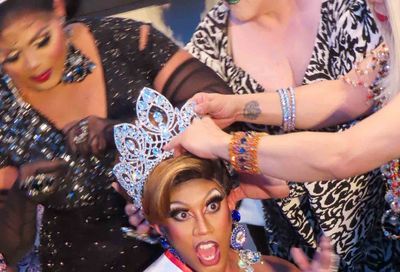Bolling Drops Out of Virginia Governor's Race
LGBT community responds to likelihood of Cuccinelli as GOP nominee
Virginia Lt. Gov. Bill Bolling (R) announced today he is suspending his campaign for governor of the commonwealth, a move that makes Attorney General Ken Cuccinelli, a fierce opponent of LGBT equality, as the presumptive Republican nominee.
In a Nov. 28 email to supporters, Bolling said he was honored to serve as Virginia’s lieutenant governor for the past seven years, and acknowledged he had sought the state’s top office. But he also acknowledged the difficulty he faced in winning the party’s nomination after the State Central Committee of the Republican Party decided in June to reverse an earlier decision to hold a statewide primary, changing the method of selecting a nominee to a closed party convention. Had the party continued its plans to hold a primary, Bolling would have had a better shot of obtaining the nomination by appealing to independents and conservative Democrats.

Ken Cuccinelli
Bolling also told supporters that he had initially hoped that Cuccinelli would step aside and help form a ”united Republican ticket” for the November 2013 election, as Bolling did in 2009 when he stepped aside and agreed to run for lieutenant governor, allowing Gov. Bob McDonnell to seek the governor’s seat. Cuccinelli announced last year he intended to challenge Bolling for the nomination.
”For the past several months my campaign team has worked hard to restructure our campaign to effectively compete in the convention process. While we have made a great deal of progress, I reluctantly concluded that the decision to change the method of nomination from a primary to a convention created too many obstacles for us to overcome,” Bolling said in his email. ”In addition, I know how divisive conventions can be, and I was concerned that a prolonged campaign between Mr. Cuccinelli and me could create deep division within our party. … The wounds that can develop from that type of process are often difficult to heal.”
”Conventions are by their very nature exclusive, and at a time when we need to be projecting a positive image and reaching out to involve more Virginians in the Republican Party, I am unwilling to be part of a process that could seriously damage our image and appeal,” Bolling continued. ”While it may have been in my self-interest to have continued the campaign and done my best to win without regard to the consequences of those actions, I have never chosen to place my self-interest ahead of our Party’s best interest, and I will not do so now.”
With Cuccinelli, a ”tea party” favorite, the likeliest GOP gubernatorial candidate, some political observers expect Terry McAuliffe, former head of the Democratic National Committee, to win the Democratic nomination. Another possible Democratic contender is former Rep. Tom Perriello, a one-term congressman who represented a district in western Virginia stretching from Charlottesville to Danville, which he narrowly lost in the 2010 Republican congressional wave.
A Quinnipiac University poll of 1,469 registered voters taken earlier this month found McAuliffe leading Cuccinelli by a 41-37 margin, with 21 percent of voters saying they are undecided.
Following Bolling’s announcement, the nonpartisan LGBT rights organization Equality Virginia issued a statement blasting the attorney general for his anti-gay record.
”We are shocked to see Attorney General Cuccinelli enter this race as a choice for governor with his past statements and actions of bigotry towards the LGBT community,” James Parrish, the group’s executive director, said in the statement. ”We hope to educate Virginians in the coming year so they can make an informed decision in this election. His previous actions as attorney general, bullying colleges and universities, the State Board of Social Services and the State Board of Juvenile Justice should be seen as alarming, overreaching and unfair.”
Cuccinelli has opposed nondiscrimination policies that include sexual orientation at Virginia’s public colleges and universities. In 2010, his office issued a letter urging those institutions to rescind any policies that protect LGBT students and employees, advising that only the General Assembly has the ability to create a protected class. The letter further advised those institutions with such policies that they had acted ”without proper authority” and should ”take appropriate actions to bring their policies in conformance with the law and public policy of Virginia.”
Cuccinelli also told the Virginia Pilot in an interview during his 2009 campaign that homosexual acts are ”intrinsically wrong” and ”behavior that is not healthy to an individual and in aggregate is not healthy to society,” suggesting that the state should adopt policies that ”reflect natural law.”
The attorney general has frequently come under fire from LGBT-rights advocates for his actions in trying to influence state boards to rescind protections for LGBT minors and families. His tactics were successful in convincing the State Board of Social Services to approve regulations on adoption that allow state-licensed private adoption and foster care agencies to deny adoption to prospective parents based on a wide variety of characteristics, including age, gender, religion, political beliefs, family status and sexual orientation.
Cuccinelli also pushed for the State Board of Juvenile Justice to strip away language preventing discrimination against LGBT youth in residential facilities. Though protections for LGBT youth remained in place, Cuccinelli claimed victory for having forced the board to alter language explicitly making sexual orientation a protected class.
Jeff Jacobs, president of the Richmond chapter of the Log Cabin Republicans, the state’s Republican LGBT political group, told Metro Weekly his chapter is hoping to start a dialogue with Cuccinelli.
”At this point, we’ve not taken a formal position on the race, but we do hope to have a meeting with the nominee and advance the conversation over many issues that are important to LGBT people across Virginia,” Jacobs said.
Support Metro Weekly’s Journalism
These are challenging times for news organizations. And yet it’s crucial we stay active and provide vital resources and information to both our local readers and the world. So won’t you please take a moment and consider supporting Metro Weekly with a membership? For as little as $5 a month, you can help ensure Metro Weekly magazine and MetroWeekly.com remain free, viable resources as we provide the best, most diverse, culturally-resonant LGBTQ coverage in both the D.C. region and around the world. Memberships come with exclusive perks and discounts, your own personal digital delivery of each week’s magazine (and an archive), access to our Member's Lounge when it launches this fall, and exclusive members-only items like Metro Weekly Membership Mugs and Tote Bags! Check out all our membership levels here and please join us today!























